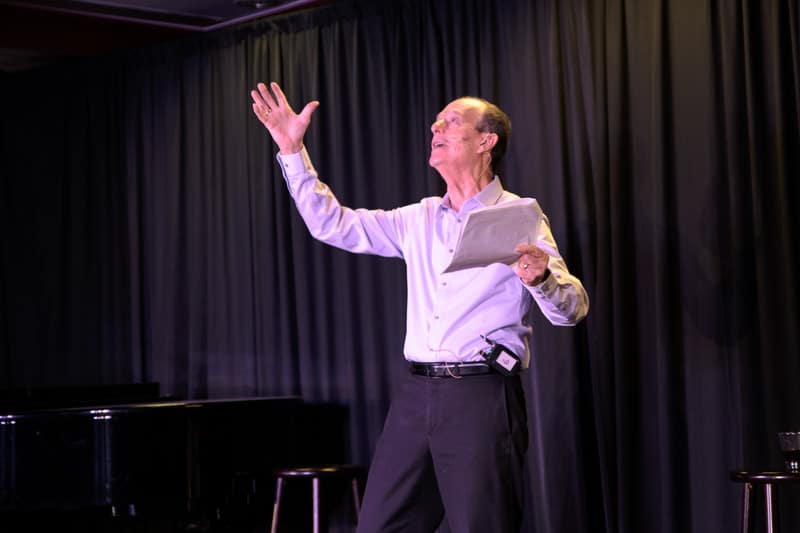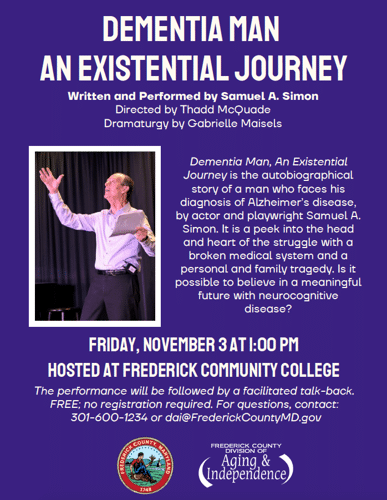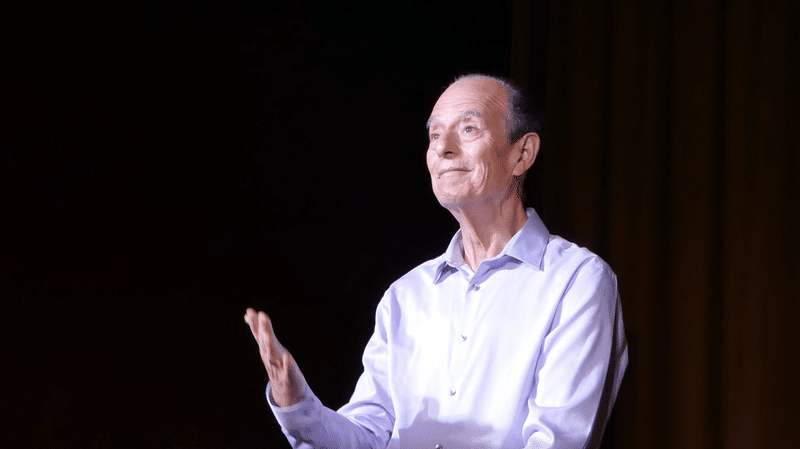In this week’s TALK series, McLean Today sits down with Sam Simon — a longtime McLean resident, playwright and actor. Simon, 78, started his career in Washington, D.C. as a lawyer for Ralph Nader’s first advocacy group and then spent 25 years as head of a public affairs firm. Simon calls his playwriting and theatre work his “4th Age.” His first play, The Actual Dance, Love’s Ultimate Journey Through Breast Cancer, starting touring in 2013 and in 2021 was turned into an award-winning biography. His new play, Dementia Man, An Existential Journey is the autobiographical story of a man who faces his diagnosis of Alzheimer’s disease. Simon was diagnosed in 2018 with Mild-Cognitive Impairment and in 2021 with Early-Stage Alzheimer’s. He is currently under medical treatment and a participant in a drug trial.
In the beginning
I started doing theatrical improv as a personal development tool after I had stopped working, as an older gentleman. I got involved in a theater group in New York. My journey with playwriting started [when] my wife got very sick and was not expected to survive. I was into playwriting so I ended up writing a play about that, called The Actual Dance, Love’s Ultimate Journey through Breast Cancer to talk about her situation and impact. Afterwards, about a year ago, I wrote a play called Dementia Man, An Existential Journey on how my life began to change.
Around 2018, I was having some confusion… and I was diagnosed with early-stage Alzheimer’s. And when you get a disease, there’s another word for it right? Dementia is an ugly and dirty word which I’ve learned to despise. When you get a very serious diagnosis, because there’s no cure for Alzheimer’s, you struggle with what to do with your life. My therapist encouraged me to write a play about it about a year ago. I got very strong encouragement [from] people I [knew] at the theater world to write about it. It is very important for me, and very important particularly I hope for the cognitively impaired world.

Sam Simon, performing his play Dementia Man, An Existential Journey. Simon has performed his one-man show at venues including the DCJCC as part of the Washington D.C. Capital Fringe Festival, Temple Rodef Shalom, area senior living spaces and the Cascades Library in Potomac Falls.
Dementia Man, An Existential Journey
The idea of this play is that. now that I know I have a terminal disease, I’m transforming [into] someone else. What should I do? What are my choices? And ultimately, that is the question of the play, and it presents that struggle. I learned I’m not the only one who has that struggle. The play is not about my acting. It’s about what the play [is] about. Some people say I’m a good actor, but I think it’s an unheard, rare voice, not a unique voice, a unique topic that somebody with the disease gets up there and talks about how you confront this uncertain future.
My purpose of this play is to describe a journey where you confront [this] different and difficult disease. You challenge the modern narratives of — first of all the term ‘dementia’ is a degrading, despicable term. I’m not crazy. These are words that are in the play; I’m not crazy, I’m not insane, I’m not mad. I’m just profoundly cognitively impaired, forgetful and on my way to transforming to be someone else. I have no idea when I’ll remember or not.
There was a lot of writing involved. I started writing in October of last year, I [had] an idea of what I wanted to do by early January with a dramaturg. They are coaches with expertise in theater and plays, and they help you craft the dramatic art of the show. I hired my dramaturge, the same person I work with to write my earlier play. We had a draft by May. Same thing happened [with] my other play, as we never stopped rehearsing and we never stopped changing. I will have a new direction, I think in a year or couple of years. I will probably add or adapt some things. I write as I get feedback from the audience. I’ve had over 100 people at my plays. And you get to learn from the audience, I hear people’s stories. That makes me understand my story differently.
The impact
I have trouble sometimes finding places and I forget a lot of recent events which I acknowledged in the play. Because it’s hard to conceive of somebody who is the stereotype of a person with dementia. And so the main question is: how do you help a person like that? And the worst thing you can do is encourage people to hide it, and that’s the current narrative. If you’re feeling memory impaired or cognitively impaired and you’re worried… about getting it checked out, don’t be afraid. Right now, people hide. People are ashamed and they blame themselves. And so part of my goal is to speak out and say Wow, look at me, I have this disease. I am a human being and I deserve and can have the same dignity as any other human being with a little help. And that’s how I end the play, I’m gonna do this for as long as I can, with the help of family, friends, doctors and maybe with the help of the audience members to be open. I want it to inspire people.
McLean roots
We have been living here in McLean for 53 years. McLean is a great spot, my [two] kids and [two of my] grandkids grew up here, and I enjoy the community. We love McLean Family Restaurant. I used to have lunch every Friday at MFR with my friend.

BY: Dania Reza
Dania Reza is the social media content curator for McLean Today. She is a senior at McLean High School and is the design editor-in-chief of her award-winning school news magazine, The Highlander.
Do you know someone in McLean who would make an interesting interview for TALK? Click here to nominate them.

